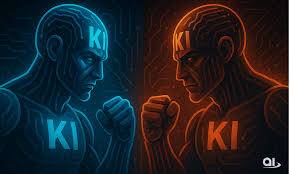Open-Source AI vs. Big Tech: Who's Really Building the Future? (And Why It Kind of Feels Like High School Drama)
A few weeks ago, I was sitting in a café trying to get a simple Python script to work (don’t ask why, long story involving YouTube tutorials and overconfidence). Anyway, I was stuck. Frustrated. About to rage-quit and pretend I’d never tried.
Then some random stranger—hoodie, earbuds, classic "I haven’t slept in two days" energy—leans over and says, “You could just use Mistral. Or maybe LLaMA, if you like open-source stuff.â€
I blinked. “Like... the animal?â€
He laughed. “No, the AI model.â€
That moment? It cracked something open in my brain.
Because here I was, banging my head against the wall, trying to learn how to code with tools made by giants, and this dude—this random coder—was building with tech made by people like him. No multi-billion-dollar boardrooms. No paid API keys. Just open code, shared online, made by and for real people.
-So what even is open-source AI?
Think of it like this:
If Big Tech AI (OpenAI, Google, Microsoft, Meta, Amazon) is like going to a super fancy restaurant—waiters in tuxedos, 14-page menus, sparkling water you didn’t ask for—then open-source AI is more like a backyard barbecue. It’s messier. It’s casual. You bring your own chair. But you actually know the people cooking.
Open-source AI tools (like LLaMA, Mistral, Falcon, Ollama, GPT4All) are being built and shared by independent developers and small research groups. And yeah, they’re not always as polished as ChatGPT or Gemini. But here’s the wild part—they’re catching up. Fast.
And some of them? They’re free. You can run them locally. Tweak them. Rebuild them. Break them (I’ve done that more than once).
-In my experience… it’s about trust
Look, I’ve used ChatGPT. A lot. It’s smart. It’s shiny. It feels like magic some days.
But I’ve also noticed this weird thing: the better these tools get, the less I understand what’s going on behind the scenes. Like… who trained it? On what data? How is it using my inputs? What’s it keeping?
Big Tech doesn’t always answer those questions. Sometimes they literally can’t.
Open-source AI, on the other hand? You can see under the hood. The code’s on GitHub. The data sets are public (mostly). There’s transparency. Collaboration. Forums where you can ask “dumb†questions and actually get answers from someone who isn’t trying to upsell you.
It’s not perfect. But it feels more human.
-I could be wrong, but…
It’s kind of like watching David and Goliath. Big Tech is throwing billions at making AI smarter, more efficient, more integrated into your every waking moment. And open-source? It’s scrappy. Maybe even chaotic.
But there’s power in that chaos.
Because when AI becomes too centralized—too “ownedâ€â€”you start to wonder: what happens when only a handful of companies control all the intelligence? What happens when innovation gets paywalled?
What happens to freedom of knowledge? To experimentation? To the garage-startup dream?
-Let’s get real for a second
Most of us just want AI that works. That saves time. That helps with homework or emails or figuring out what to cook when you have three sad-looking vegetables in the fridge.
But behind the scenes, there’s a war happening. Not with missiles, but with models.
Big Tech wants control.
Open-source wants community.
And it’s weirdly personal. Because the tools we use today? They shape how we think, how we create, how we connect.
-Final thought (and maybe a question that matters more than it seems):
Do you want to use AI… or be used by it?
Because every time we click “Accept,†every time we input our data, every time we lean on a tool to write, think, or respond for us—we’re not just choosing convenience. We’re voting for the future we want.
So maybe next time you ask ChatGPT for help (hi 👋), pause for a second.
And ask yourself: Who built this? And who gets to decide what it becomes?
-Ever tried using an open-source AI model? Or maybe you’re fully team Big Tech and love the polish. Either way, I’d love to hear your take. Because this isn't just tech. It's about who’s building the brain of tomorrow—and whether it belongs to all of us, or just a few.




No comments yet
Be the first to share your thoughts!